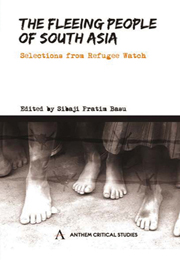Book contents
- Frontmatter
- Contents
- Acronyms and Abbreviations
- Foreword by Ranabir Samaddar
- Preface
- ETHICAL ISSUES
- Introduction
- Ethical Origins of Refugee Rights and Humanitarian Law
- Power, Fear, Ethics
- Victim's Right to Communicate
- The Guiding Principles: Normative Status and its Effective Domestic Implementation
- The Boundaries of Belonging: Reflections on Migration Policies in the Twenty-First Century
- LAWS
- SOUTH ASIA
- INDIA
- GENDER
- INTERVIEW/CORRESPONDENCE
- REPRESENTATIONS
- Index
Victim's Right to Communicate
from ETHICAL ISSUES
Published online by Cambridge University Press: 05 March 2012
- Frontmatter
- Contents
- Acronyms and Abbreviations
- Foreword by Ranabir Samaddar
- Preface
- ETHICAL ISSUES
- Introduction
- Ethical Origins of Refugee Rights and Humanitarian Law
- Power, Fear, Ethics
- Victim's Right to Communicate
- The Guiding Principles: Normative Status and its Effective Domestic Implementation
- The Boundaries of Belonging: Reflections on Migration Policies in the Twenty-First Century
- LAWS
- SOUTH ASIA
- INDIA
- GENDER
- INTERVIEW/CORRESPONDENCE
- REPRESENTATIONS
- Index
Summary
Although in common parlance victims of forced displacement are often clubbed together as a single and monolithic category, there are significant variations in the nature and extent of victimhood suffered by them. Thus, the victims of development induced displacement constitute a category separate in many ways from those who have been displaced as a result of say, interethnic conflicts and violence. The first category of victims may have lost their homes or cultivable lands but may continue to subscribe to the same development paradigm and view displacement as one of its necessary costs that one should bear albeit with great pain, in the collective interest of the nation. The same person on the other hand, may look upon ethnic violence as simply macabre and senseless and hence detrimental to the nation and its development. It could as well be the other way round. One who finds ethnic violence as an inevitable and unavoidable means of asserting one's identity is unlikely to discover any virtue in the development of the nation as a vibrant, multicultural entity. The graded nature of victimhood therefore should not escape our notice.
COMMUNICATING RIGHTS CLAIMS
Accordingly, their rights can hardly be of one and the same type. One wonders whether it will ever be possible for us to evolve an agenda of rights common to all of them.
- Type
- Chapter
- Information
- The Fleeing People of South AsiaSelections from Refugee Watch, pp. 32 - 36Publisher: Anthem PressPrint publication year: 2009



